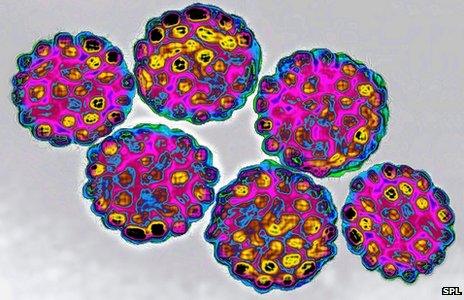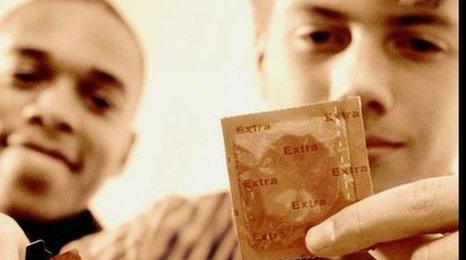Newsbeat's guide to... HPV virus
- Published

Hollywood actor Michael Douglas has claimed his battle against throat cancer was caused by performing oral sex.
The 68-year-old said his stage-four cancer was contracted through the human papillomavirus (HPV), a sexually transmitted disease.
He told the Guardian, external: "Without wanting to get too specific this particular cancer is caused by HPV.
"I did worry if the stress caused by my son's incarceration didn't help trigger it. But yeah, it's a sexually transmitted disease that causes cancer."
Newsbeat asked Professor Margaret Stanley from the department of pathology at the University of Cambridge about the facts behind HPV and oral cancer.
What is HPV?
HPV is a very common virus. There are more than 100 types.
The virus lives on our skin or in skin like areas so it can be found in the mouth, genital areas and anus.
Lots of people are infected with HPV, including the strains which can cause cancer, and often our immune systems will just naturally protect us from the virus and prevent it from developing into something more serious.
However, some people have immune systems which, for whatever reason, can't treat the virus and this can lead to it changing cells in the body which in turn may lead cancer.
What is HPV-related oral cancer?
HPV-related oral cancer affects the throat and is often diagnosed in the tongue or tonsils.
How can you get it?
HPV can be passed by skin to skin and genital contact.
It is most often passed during vaginal and anal sex. However, as HPV can live in your mouth, anus and genital areas it can be passed through oral sex.
There are two types or strains of HPV which are most likely to cause cancer - HPV-16 and HPV-18.
HPV-16 is thought to be responsible for around 60% of cervical cancers, 80% of cancers in the anus and 60% of oral cancers.
Doctors cannot control the virus and can't predict if people will get the virus.
However, if you have a lot of sexual partners you are more likely to be infected with HPV and if your immune system cannot naturally get rid of the virus it can put you at risk.
How do you prevent it?
By having the HPV vaccine or changing your sexual behaviour.
Realistically doctors acknowledge that people will have oral sex.
If you have a normal amount of partners the risk of HPV developing into something like cancer would not be as high as someone who had an extremely large number of partners.
Can you get a vaccine?
The government vaccinates girls aged 12 to 13 against HPV.
The vaccine involves three injections over six months and can be given to people before they get infected.
Some doctors think the vaccine should be available to both boys and girls as they believe the vaccine will offer protection to both sexes from HPV related cancers.
The vaccine is available for men or older women but you would have to pay for it privately.
Does the vaccine protect you from getting it?
The way the vaccine works is that it builds a person's immunity to the two main cancer causing strains, HPV-16 and HPV-18.
Both strains can be prevented by having the HPV vaccine. The vaccine means the virus can not get into cells and change them.
Is there a cure?
No. You can only prevent HPV-related oral cancer either by having the vaccine or by changing your sexual behaviour.
However, doctors say HPV-related oral cancers respond better to treatment than any other types of cancer in the throat, head and neck.
Follow @BBCNewsbeat , externalon Twitter
- Published13 September 2012
